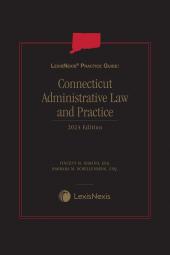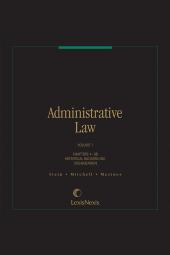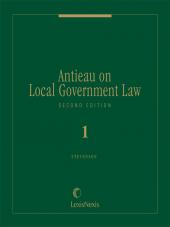We are in the process of migrating the LexisNexis Store. During this transition, some customers may not be able to access their Download Center or new electronic orders. Please call Customer Service 1-800-833-9844 or Chat With A Support Representative <https://supportcenter.lexisnexis.com/app/chat/store_chat/>
LexisNexis Practice Guide: Connecticut Administrative Law and Practice
Select a format
 International Order Inquiry
International Order Inquiry
Select subscription type
Terms & conditions
Subscribers receive the product(s) listed on the Order Form and any Updates made available during the annual subscription period. Shipping and handling fees are not included in the annual price.
Subscribers are advised of the number of Updates that were made to the particular publication the prior year. The number of Updates may vary due to developments in the law and other publishing issues, but subscribers may use this as a rough estimate of future shipments. Subscribers may call Customer Support at 800-833-9844 for additional information.
Subscribers may cancel this subscription by: calling Customer Support at 800-833-9844; emailing customer.support@lexisnexis.com; or returning the invoice marked "CANCEL".
If subscribers cancel within 30 days after the product is ordered or received and return the product at their expense, then they will receive a full credit of the price for the annual subscription.
If subscribers cancel between 31 and 60 days after the invoice date and return the product at their expense, then they will receive a 5/6th credit of the price for the annual subscription. No credit will be given for cancellations more than 60 days after the invoice date. To receive any credit, subscriber must return all product(s) shipped during the year at their expense within the applicable cancellation period listed above.
The total price includes the product(s) listed in the Order Form and any Updates for a limited period (minimum period of 30 days) after the order is placed ("Order Window"). Shipping and handling fees are not included in the grand total price.
All shipments may be returned, at subscribers' expense, for full credit of the Price within 30 days of receipt.
Shipments may not be returned, and no credits will be issued, more than 30 days after receipt.
After the Order Window, subscribers will receive notice of Updates along with the then-current grand total price and order process as Updates become available. Subscribers will only be shipped those Updates they specifically request.
Product description
View a sample of this title using the ReadNow feature
LexisNexis Practice Guide: Connecticut Administrative Law and Practice helps attorneys to gain valuable insight into Connecticut administrative practices and procedures that are useful to practitioners before both administrative agencies and courts. The guide provides detailed discussion of both procedural and substantive considerations, together with comprehensive summaries of helpful legal principles and standards of review from highly experienced Connecticut lawyers and judges. The publication contains relevant statutes, regulations and court rules, and serves as an easy-to- use desk reference to help avoid potential challenges facing administrative law practitioners.
The previous edition's ISBN is 9781663376893.
eBooks, CDs, downloadable content, and software purchases are noncancelable, nonrefundable and nonreturnable. Click here for more information about LexisNexis eBooks. The eBook versions of this title may feature links to Lexis+® for further legal research options. A valid subscription to Lexis+® is required to access this content.
Table of contents
Chapter 1 INTRODUCTION TO ADMINISTRATIVE LAW
§ 1.01 Introduction
§ 1.02 The Vocabulary of Administrative Law
§ 1.03 The Administrative Procedure Act in Connecticut
§ 1.04 Separation of Powers
§ 1.05 Chevron U.S.A., Inc. v. Natural Resources Defense Council, Inc.
§ 1.06 Power and Limitations of Administrative Agencies
§ 1.07 The Power of Attorney General and the Legislation Regulation Review Committee relating to Administrative Agencies
§ 1.08 Statutory Basis—Breadth and Scope of Administrative Power
§ 1.09 Checklist: Analyzing a case involving an agency
§ 1.10 Appendix 1-1: The Connecticut Administrative Procedures Act
Chapter 2 RULEMAKING
§ 2.01 Introduction
§ 2.02 What is a “Regulation”
§ 2.03 Types of Rules
§ 2.04 The Rulemaking Process: Notice of Proposed
§ 2.05 Substantive Requirements for Rulemaking
§ 2.06 The Comment Period
§ 2.07 The Regulatory Flexibility Analysis and Small Business Impacts
§ 2.08 The Public Hearing
§ 2.09 The Regulation-Making Record
§ 2.10 Review by the Attorney General and the LRCC
§ 2.11 Effective Date
§ 2.12 Permissive Regulations
§ 2.13 Mandatory regulations
§ 2.14 Emergency Regulations
§ [1] Imminent Peril
§ [2] Effective Date
§ 2.15 Petitions for Regulation
§ 2.15A Administrative Responses to the COVID-19 Global Pandemic
§ 2.16 Appendix 2-1: Sacket v. U.S. Environmental Protection Agency, 598 U.S. 651 (2023)
§ 2.17 Appendix 2-2: Legislative Regulation Review Committee (2023-2024 Rules)
§ 2.18 Appendix 2-3: Regulation Certification Form R39DF
§ 2.19 Appendix 2-4: Manual for Drafting Regulations (Rev. Jan. 2018)
§ 2.20 Appendix 2-5: Executive Order 37
Chapter 3 FREEDOM OF INFORMATION—PUBLIC MEETINGS
§ 3.01 Introduction
§ 3.02 Legislative History
§ 3.03 Key Definitions
§ 3.04 Agenda, Notice and Minute Requirements
§ 3.05 Conduct of Public Meetings
§ 3.06 Requirements for Executive Sessions
§ 3.07 Appeals
§ 3.08 Appendices
Chapter 4 FREEDOM OF INFORMATION—PUBLIC RECORDS
§ 4.01 Introduction
§ 4.02 Records Exempt from Disclosure Under the FOIA
§ 4.03 What Constitutes “An Invasion of Personal Privacy” Under the Act
§ 4.04 The Attorney-Client Privilege
§ 4.05 The Home Address Exclusion
§ 4.06 Handling Voluminous and Ambiguous Requests for Information
§ 4.07 Requests that Require Research
§ 4.08 Requests that Seek Preliminary Information
§ 4.09 Costs Associated with New Technology
§ 4.10 Police Records and Evidence
§ 4.11 Court Documents and Record Retention
§ 4.12 Appendices
Chapter 5 CONTESTED CASES—THE PREHEARING PROCESS
§ 5.01 What is a contested case?
§ 5.02 Two words that matter—“Statute or Regulation”
§ 5.03 Licenses
§ 5.04 Procedural Requirements in a Contested Case
§ 5.05 The Right to Reasonable Notice
§ 5.06 Pleadings
§ 5.07 Party Standing
§ 5.08 Intervention
§ 5.09 Continuances
§ 5.10 Disposition of Contested Cases
§ 5.11 Discovery
§ 5.12 Prehearing Conferences
§ 5.13 Appendices
Chapter 6 THE ANATOMY OF A CONTESTED CASE
§ 6.01 Introduction
§ 6.02 Commencement of a Contested Case
§ 6.03 The Hearing Officer
§ 6.04 Level of Formality
§ 6.05 Prehearing Conference
§ 6.06 Settlement Procedures
§ 6.07 Settlement Conferences
§ 6.08 Mediation
§ 6.09 Ex Parte Communication
§ 6.10 Evidence
§ 6.11 Hearsay Evidence
§ 6.12 The Right to Cross-Examination
§ 6.13 Official Notice
§ 6.14 Written Testimony
§ 6.15 Making the Record
§ 6.16 The Hearing
§ 6.17 Dismissal without a Hearing
§ 6.18 Custody of the Record
Chapter 7 THE POST-HEARING PROCESS
§ 7.01 The Process depends on the nature of the hearing
§ 7.02 Time for the Decision
§ 7.03 Contents of Decision
§ 7.04 Findings of Fact
§ 7.05 Use of Agency Expertise
§ 7.06 Conclusion of Law
§ 7.07 Service of the Decision and its Effective Date
§ 7.08 Indexing of Written Orders and Final Decisions
§ 7.09 Precedential Value of Agency Written Orders on Final Decisions in Contested Cases
§ 7.10 Reconsideration
§ 7.11 Informal Disposition of a Contested Case
§ 7.12 Matters Involving Licenses
§ 7.13 Judicial Review of Contested Case Orders
§ 7.14 Only a Contested Case can be appealed
§ 7.15 Appeal of Final Decision in Contested Cases to the Superior Court
§ 7.16 Standards of Review of Agency Action
Chapter 8 COLLATERAL ESTOPPEL, RES JUDICATA, STARE DECISIS AND THE EQUITABLE DEFENSES
§ 8.01 Res Judicata and Collateral Estoppel
§ 8.02 Stare Decisis
§ 8.03 Equitable Estoppel
§ 8.04 Laches
Chapter 9 OVERVIEW OF LOCAL ADMINISTRATIVE LAW
§ 9.01 Introduction
§ 9.02 The Zoning Commission
§ 9.04 The Zoning Board of Appeals
§ 9.05 The Inland Wetland Commission
§ 9.06 Historic District Commissions
§ 9.07 Board of Assessment Appeals
§ 9.08 The Zoning Enforcement Officer
§ 9.09 The Building Inspector and the Building Board of Appeals
§ 9.10 Health Director and Sanitarian
§ 9.11 Other Local Administrative Penalties and Enforcement Remedies
§ 9.12 Appointment of Hearing Officers
§ 9.13 Issuance of Citations and Notices
§ 9.14 Conduct of Hearing
§ 9.15 Decision of Hearing Officer
§ 9.16 Enforcement of Assessment in Superior Court
§ 9.17 Right of Appeal
Chapter 10 ETHICAL ISSUES FOR THE ADMINISTRATIVE LAWYER
§ 10.01 Introduction
§ 10.02 Conflicts of Interest
§ 10.03 Who is the client?
§ 10.04 When the organization’s interest may be or may become adverse to one or more of its constituents
§ 10.05 When an officer, employee or other constituent is engaged in an action in a manner contrary to the best interests of the organizational client
§ 10.06 When you can represent a constituent individual
§ 10.07 Dual Representation—Advocate and Counselor
§ 10.08 Right to Counsel in Administrative Hearings
§ 10.09 Ex Parte Communications
§ 10.10 Ex Parte Communications in the Administrative Law Setting
§ 10.11 Ex Parte Communications and the Connecticut Uniform Administrative Procedures Act
§ 10.12 Communications with Represented Parties
§ 10.13 Multiple Client Conflicts of Interest—Rule 1.7
§ 10.14 Imputed conflicts (Rule 1.10(a))
§ 10.15 The Connecticut Code of Ethics
§ 10.16 Necessary Expenses
§ 10.17 Conflicts of Interest
§ 10.18 Ethics Enforcement
§ 10.19 Appendices
Chapter 11 WHERE TO FIND ADMINISTRATIVE AGENCY MATERIALS
§ 11.01 Introduction
§ 11.02 Constitution
§ 11.03 State Statutes/State Statutory Code
§ 11.04 Legislative History
§ 11.05 State Session Laws
§ 11.06 State Bills
§ 11.07 Regulations of Connecticut State Regulations
§ 11.08 The Connecticut Register and Manual
§ 11.09 Following the Regulation-Making Process
§ 11.10 Administrative Agency Procedural Rules
§ 11.11 The Connecticut State Building Code
§ 11.12 Executive Orders
§ 11.13 Attorney General
§ 11.14 Digest of Administrative Reports
§ 11.15 Connecticut Administrative Agency Decisions and Guidance
§ 11.16 Online Sources for Connecticut Administrative Agency Regulations and Decisions
§ 11.17 Directories of Connecticut State Agencies
§ 11.18 County/Municipality/City Codes
§ 11.19 Connecticut’s Court System / State Case Law
§ 11.20 State Court Rules
§ 11.21 Appendices
TABLE OF CASES
TABLE OF STATUTES
INDEX
 Lexis Nexis
Lexis Nexis 

